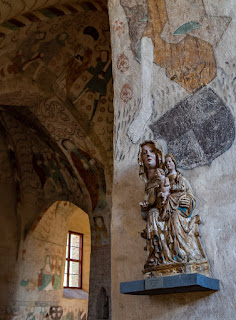A grace of sense – soundings in theological aesthetics

“A grace of sense” is a quote from T. S. Eliot’s Burnt Norton (from Four Quartets). What makes it of interest for me is its ambiguousness. One could either read it as “unmerited blessing of meaning” or “elegance of perception” , why not “beauty of reason” or eventually “gratification of senses”. In all these aspects, this phrase illuminates the scope of theological aesthetics. The key values in aesthetic theology are beauty, gratuitousness, expertise, sensory perception, a feeling of significance and intrinsic enjoyment. “A grace of sense” refers also to the way an aesthetic experience often occurs when one least expects it to happen. All artistic occasions – concerts, exhibitions etc – are intended to arouse “a grace of sense”, but one cannot guarantee that it takes place. When an aesthetic experience happens, one cannot but gratefully accept it. In this regard the aesthetic experience resembles greatly the religious experience of grace. That the world makes sense ...




